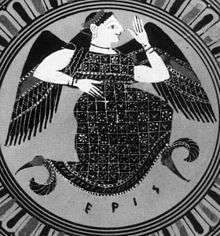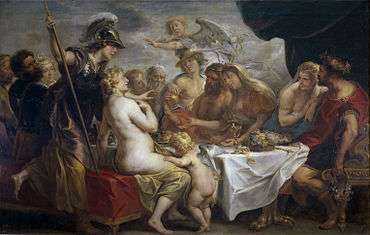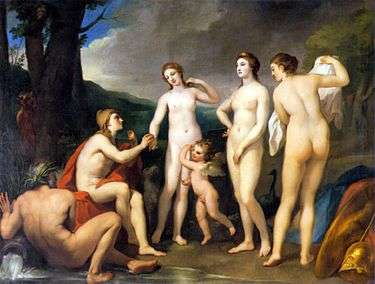Eris (mythology)
| Eris | |
|---|---|
| Goddess of chaos, strife and discord | |
 Eris on an Attic plate, ca. 575–525 BC | |
| Symbol | Golden Apple of Discord |
| Parents | Nyx (alone), or Zeus and Hera |
| Siblings | Aeacus, Angelos, Aphrodite, Apollo, Ares, Artemis, Athena, Dionysus, Eileithyia, Enyo, Ersa, Hebe, Helen of Troy, Heracles, Hermes, Minos, Pandia, Persephone, Perseus, Rhadamanthus, the Graces, the Horae, the Litae, the Muses, the Moirai, or Thanatos, Hypnos, the Keres |
| Children | Dysnomia, Atë, Lethe, Limos, Algos, Hysminai, Makhai, Phonoi, Androktasiai, Neikea, Pseudea, Logoi, Amphilogiai, Horkos |
| Roman equivalent | Discordia |
| Part of a series on | ||||||
| Ancient Greek religion | ||||||
|---|---|---|---|---|---|---|
 | ||||||
|
Godheads
|
||||||
|
Ethics |
||||||
|
Practices |
||||||
|
| ||||||
Eris (/ˈɪərɪs, ˈɛrɪs/; Greek: Ἔρις, "Strife")[1] is the Greek goddess of strife and discord. Her name is the equivalent of Latin Discordia, which means "discord". Eris' Greek opposite is Harmonia, whose Latin counterpart is Concordia. Homer equated her with the war-goddess Enyo, whose Roman counterpart is Bellona. The dwarf planet Eris is named after the goddess, as is the religion Discordianism.
Characteristics in Greek mythology



In Hesiod's Works and Days 11–24, two different goddesses named Eris are distinguished:
So, after all, there was not one kind of Strife alone, but all over the earth there are two. As for the one, a man would praise her when he came to understand her; but the other is blameworthy: and they are wholly different in nature. For one fosters evil war and battle, being cruel: her no man loves; but perforce, through the will of the deathless gods, men pay harsh Strife her honour due.
But the other is the elder daughter of dark Night (Nyx), and the son of Cronus who sits above and dwells in the aether, set her in the roots of the earth: and she is far kinder to men. She stirs up even the shiftless to toil; for a man grows eager to work when he considers his neighbour, a rich man who hastens to plough and plant and put his house in good order; and neighbour vies with his neighbour as he hurries after wealth. This Strife is wholesome for men. And potter is angry with potter, and craftsman with craftsman and beggar is jealous of beggar, and minstrel of minstrel.
In Hesiod's Theogony (226–232), Strife, the daughter of Night, is less kindly spoken of as she brings forth other personifications as her children:
- And hateful Eris bore painful Ponos ("Hardship"),
- Lethe ("Forgetfulness") and Limos ("Starvation") and the tearful Algae ("Pains"),
- Hysminai ("Battles"), Makhai ("Wars"), Phonoi ("Murders"), and Androktasiai ("Manslaughters");
- Neikea ("Quarrels"), Pseudea ("Lies"), Logoi ("Stories"), Amphillogiai ("Disputes")
- Dysnomia ("Anarchy") and Ate ("Ruin"), near one another,
- and Horkos ("Oath"), who most afflicts men on earth,
- Then willing swears a false oath.[2]
The other Strife is presumably she who appears in Homer's Iliad Book IV; equated with Enyo as sister of Ares and so presumably daughter of Zeus and Hera:
Strife whose wrath is relentless, she is the sister and companion of murderous Ares, she who is only a little thing at the first, but thereafter grows until she strides on the earth with her head striking heaven. She then hurled down bitterness equally between both sides as she walked through the onslaught making men's pain heavier. She also has a son whom she named Strife.
Enyo is mentioned in Book 5, and Zeus sends Strife to rouse the Achaeans in Book 11, of the same work.
The most famous tale of Eris recounts her initiating the Trojan War by causing the Judgement of Paris. The goddesses Hera, Athena and Aphrodite had been invited along with the rest of Olympus to the forced wedding of Peleus and Thetis, who would become the parents of Achilles, but Eris had been snubbed because of her troublemaking inclinations.
She therefore (as mentioned at the Kypria according to Proclus as part of a plan hatched by Zeus and Themis) tossed into the party the Apple of Discord, a golden apple inscribed τῇ καλλίστῃ (Ancient Greek: tē(i) kallistē(i)) – "For the most beautiful one", or "To the Fairest One" – provoking the goddesses to begin quarreling about the appropriate recipient. The hapless Paris, Prince of Troy, was appointed to select the fairest by Zeus. The goddesses stripped naked to try to win Paris' decision, and also attempted to bribe him. Hera offered political power; Athena promised infinite wisdom; and Aphrodite tempted him with the most beautiful woman in the world: Helen, wife of Menelaus of Sparta. While Greek culture placed a greater emphasis on prowess and power, Paris chose to award the apple to Aphrodite, thereby dooming his city, which was destroyed in the war that ensued.
In Nonnus' Dionysiaca, 2.356, when Typhon prepares to battle with Zeus:
Eris ("Strife") was Typhon's escort in the melée, Nike ("Victory") led Zeus to battle.
Another story of Eris includes Hera, and the love of Polytekhnos and Aedon. They claimed to love each other more than Hera and Zeus were in love. This angered Hera, so she sent Eris to rack discord upon them. Polytekhnos was finishing off a chariot board, and Aedon a web she had been weaving. Eris said to them, "Whosoever finishes thine task last shall have to present the other with a female servant!" Aedon won. But Polytekhnos was not happy by his defeat, so he came to Khelidon, Aedon's sister, and raped her. He then disguised her as a slave, presenting her to Aedon. When Aedon discovered this was indeed her sister, she chopped up Polytekhnos' son and fed him to Polytekhnos. The gods were not pleased, so they turned them all into birds.
Cultural influences
Discordianism
Eris has been adopted as the patron deity of the modern Discordian religion, which was begun in the late 1950s by Gregory Hill and Kerry Wendell Thornley under the pen names of "Malaclypse the Younger" and "Omar Khayyam Ravenhurst". The Discordian version of Eris is considerably lighter in comparison to the rather malevolent Graeco-Roman original. A quote from the Principia Discordia, the first holy book of Discordianism, attempts to clear this up:
One day Mal-2 consulted his Pineal Gland and asked Eris if She really created all of those terrible things. She told him that She had always liked the Old Greeks, but that they cannot be trusted with historic matters. "They were," She added, "victims of indigestion, you know."[3]
The story of Eris being snubbed and indirectly starting the Trojan War is recorded in the Principia, and is referred to as the Original Snub. The Principia Discordia states that her parents may be as described in Greek legend, or that she may be the daughter of Void. She is the Goddess of Disorder and Being, whereas her sister Aneris (called the equivalent of Harmonia by the Mythics of Harmonia) is the goddess of Order and Non-Being. Their brother is Spirituality.[4]
The concept of Eris as developed by the Principia Discordia is used and expanded upon in the science fiction work The Illuminatus! Trilogy by Robert Shea and Robert Anton Wilson (in which characters from Principia Discordia appear). In this work, Eris is a major character.[5]
The classic fairy tale Sleeping Beauty is partly inspired by Eris's role in the wedding of Peleus and Thetis. Like Eris, a malevolent fairy curses a princess after not being invited to the princess' christening.[6][7]
In popular culture
Eris serves as the main antagonist of the animated film Sinbad: Legend of the Seven Seas. She controls a vast army of creatures resembling constellations, some of which being Cetus, a giant kraken; Scorpius, a giant scorpion; Musca, a giant fly; Leo, a giant lion; Lacerta, a giant lizard; the Roc, a giant white bird; and the Sirens, a group of water spirits. She appears as a black-haired woman with blue skin, red eyes with yellow scleras, and wears a purple strapless dress.
In the television show, Hercules: The Legendary Journeys and its spin-offs Young Hercules and Xena: Warrior Princess, Discord is a recurring antagonist, Ares's henchwoman and pseudo gun moll. Strife was reimagined as a male character, also a flunky of Ares.
In The Grim Adventures of Billy and Mandy, Eris is a recurring character, often seen with her Golden Apple of Discord. She is an antagonist, though she is represented in a comedic fashion.
In the video game, "Glory of Heracles", Eris is a playable character, although her story is changed a bit, with her being a child, then later being romantically involved with Prometheus.
Eris makes a cameo appearance in the fantasy novel The House of Hades as one of the several children of Nyx seen in the book.
In The New 52 relaunched Wonder Woman title, Eris was renamed "Strife". She is sarcastic, venomous, and a drinker, though both Diana and Hermes consider her mentality to be like that of a spiteful child.[8]
In EVE Online, Eris is the name of the Gallente Interdictor.
In the Light Novel Mushoku Tensei Eris is one of the main protagonists with a very short temper.
In the Freedom City setting, Eris is a high power level antagonist, particularly for player characters with supernatural ties.
See also
References
- ↑ Of uncertain etymology; connections with the verb ὀρίνειν orinein, "to raise, stir, excite," and the proper name Ἐρινύες Erinyes have been suggested; R. S. P. Beekes has rejected those derivations and suggested a Pre-Greek origin (Etymological Dictionary of Greek, Brill, 2009, p. 459).
- ↑ Translation by Richard Caldwell, Hesiod's Theogony, Focus Publishing/R. Pullins Company (June 1, 1987). ISBN 978-0-941051-00-2.
- ↑ "The Principia Discordia". Ology.org. 1997-04-21. Retrieved 2012-06-14.
- ↑ "Page 57". Principia Discordia. Retrieved 2012-06-14.
- ↑ "Robert Anton Wilson: Searching For Cosmic Intelligence" by Jeffrey Elliot Interview discussing novel (URL accessed 21 February 2006)
- ↑ H. J. Rose (2006). A Handbook of Greek Mythology, Including Its Extension to Rome. Kessinger Publishing. ISBN 978-1-4286-4307-9. Retrieved 2007-11-06.
- ↑ Maria Tatar (Ed.) (2002). The Annotated Classic Fairy Tales. W. W. Norton & Company. ISBN 978-0-393-05163-6. Retrieved 2007-11-06.
- ↑ http://www.comicvine.com/eris/4005-15769/
External links
| Wikimedia Commons has media related to Eris (mythology). |
- Goddess Eris at Theoi.com, ancient texts and art
- Hesiod’s Works And Days
- Hesiod’s Theogony
- Homer’s Iliad
- Homer's Iliad at Gutenberg (there are many different translations at Gutenberg)